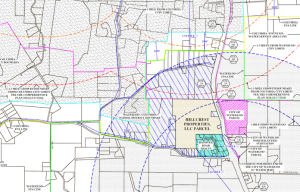Monroe County talks transportation
Transportation was the topic du jour Monday during the Monroe County Board meeting.
The meeting began with commissioners recognizing recently-retired county road commissioners George Gregson and Ed Breeding for service of 24 and 18 years, respectively.
Monroe County Engineer Aaron Metzger also addressed the board, discussing upcoming projects and presenting the 2025 “transportation plan study map” for the county.
A major bridge project on Bluff Road will begin later this month.
The bridge over Carr Creek, just north of the Valmeyer Road intersection with Bluff Road west of Columbia, will undergo a two-stage renovation to enhance support of the bridge as well as improve and widen the road surface.
The project will require lane closures on Bluff Road beginning May 27.
Valmeyer Road, which is already closed from D Road to Bluff Road due to a recent collapse following several rounds of heavy rain, was to be closed during the first phase of the bridge project.
Metzger said he had not been advised by Columbia of a plan to repair and eventually reopen Valmeyer Road.
During Monday night’s Columbia City Council meeting, Columbia Engineer Chris Smith reported the city was evaluating several different repair options and is deciding the best approach to provide a permanent solution to recurring erosion issues on Valmeyer Road.
Smith also noted some motorists have been ignoring the “road closed” signage, but advised travel on Valmeyer would be impossible once the Bluff Road bridge project begins later this month.
Metzger estimated the project would take approximately 90-95 “working days” to complete, meaning work will likely continue until November.
He was hopeful the first phase of the project would be completed in early August prior to local schools resuming classes after summer break.
Commissioner Vicki Koerber asked Metzger about another upcoming road project in Waterloo: the long-awaited Rogers Street extension and relocation project.
Metzger once again reported the joint project between Monroe County and Waterloo needs to obtain necessary right-of-way agreements and finalize construction plans before the project can begin.
If all pre-requisites are satisfied, Metzger reported extension work would begin in spring 2026.
Board Chairman George Green asked if there were any issues on county roads as a result of recent heavy rains.
Metzger noted many culverts in the area are not designed to handle those amounts of water in a short amount of time, with crop debris adding problems, although there have not been any major issues lately.
Metzger explained some bodies of water go out of their banks, but quickly recede once the rain subsides.
“Creeks are going where they want to go,” Metzger concluded.
Metzger then presented the latest transportation study plan for Monroe County.
He stressed the map and many of the projects described within are not official, and many of the items have not been funded or approved.
Some of the projects to be considered included another attempt for grant funding to install “J turn” intersections to help traffic along Route 3 at Hanover Road and EE Road.
During the April 21 meeting, longtime meeting attendee Pat Kelly asked commissioners to approve a re-application for grant funds to construct a J turn at Hanover Road.
Metzger said he is re-applying, although the project did not “score” highly enough during the first application due to lower number of accidents at that intersection compared to other applicants despite incidents near Hanover Road seeming to be more severe in terms of damage.
Also to be considered are improvements and realignment of the intersection of Route 3 at Kaskaskia and Old Red Bud roads, the possibility of making Route 3 a four-lane divided highway from Vandebrook Drive in Waterloo to Red Bud and possible alternate egresses from several subdivisions in unincorporated areas of the county, among others.
The study map includes other potential traffic improvement projects in addition to a few that are either already begun or are in the official planning stage.
Also addressing the board Monday were representatives of the Monroe Randolph Transit District.
MRTD Executive Director Jesica Gentry Schlimme said the bi-county transportation service will be implementing new dispatch software to better serve MRTD customers.
Schlimme also noted the twice-daily express route from Waterloo to the MetroLink station in East St. Louis is closing due to lack of use.
She then went over rider statistics from the past year, noting 14,105 total trips taken between April 2, 2024 and March 31, 2025.
While use is slightly higher in Randolph County, trips originating or terminating in Monroe County accounted for 44 percent of total trips.
About 40 percent of riders in Monroe County used MRTD for employment purposes, while about half of Randolph County patrons used the service for transportation to medical facilities.
Schlimme also announced MRTD will be conducting a ridership survey in the near future, saying it will be vital to tailor services in the future for the needs of riders in the bi-county area.
She also added she is trying to remove misinformation about MRTD to show the community how valuable the service can be to everyone.
“You don’t have to be a certain age or in a certain income bracket to qualify” for MRTD service, Schlimme said, “It’s for everyone.”
Many of the rides are pre-scheduled, with set pick-up either to or from a destination.
Schlimme explained that if a trip originates in or has a destination of Monroe or Randolph County, MRTD can provide ride services for an average of about $6 per trip.
She also noted municipalities in Randolph County have passed ordinances to use taxpayer funding as part of the “Go Local” program – half price fare for Randolph County residents.
Schlimme said she is hoping to duplicate the program in Monroe County, but added that while the MRTD board has nine available seats, there is currently no representative for Monroe County, Columbia or Valmeyer.
Monroe County State’s Attorney Ryan Webb also joined the conversation, asking if MRTD could be a possible solution for those who have court dates but claim to not have transportation.
Webb noted transportation is a “significant need,” and having MRTD as an option could “remove excuses” for not appearing in court.
Webb also noted the availability of a reliable transportation option would also benefit the county’s pre-trial services and probation department.
Schlimme reiterated the only qualifications are origination or termination in Monroe County or Randolph County.
She also noted a group of parents have been using the service to transport school-age children to baseball practice in Sparta, as the practice field is a significant distance from the school itself.
Schlime said she was “super excited” to begin the needs survey, stressing that participation will be key to producing services the counties want and need.
Koerber noted the “remarkable turnaround” MRTD has made in recent years.
Schlimme said the availability of state and federal funding has helped the service improve, and under her leadership the organization has been able to build reserves to improve scope and quality of services.
Learn more about the public transportation service by visiting GoMRTD.comom or calling 618-443-9087.
During the April 21 meeting, commissioners officially adopted a county credit card policy.
Alicia Emmerich of the Oak Hill senior living and rehabilitation center also gave her monthly report, noting the new recreation room at the county-owned center is nearly complete and will feature a putting green, among other amenities.
The rec room was funded through the Monroe County Nursing Home (Oak Hill) Endowment Board.
The next meeting of the Monroe County Board will be 8:15 a.m. May 19 at the Monroe County Courthouse.






